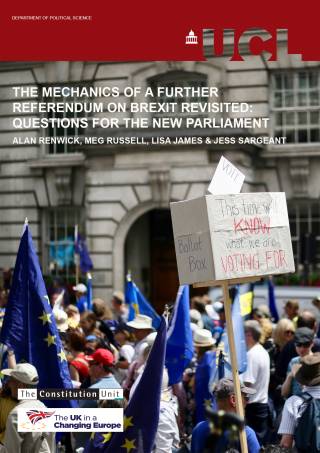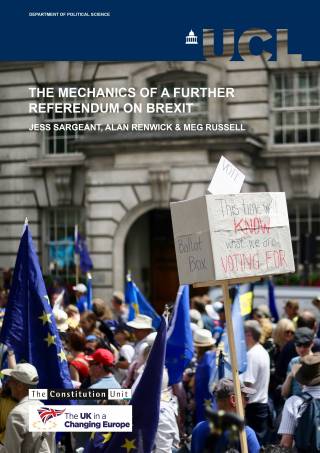During the Brexit process, some called for a second referendum on the matter. The Unit conducted research on the mechanics of a further referendum to inform such debates. The Constitution Unit had no position on Brexit, but it recognises the importance of ensuring referendums are carefully planned and transparently conducted, so that they command the maximum legitimacy.
The first report, The Mechanics of a Further Referendum on Brexit, was published in October 2018. The second report, The Mechanics of a Further Referendum on Brexit Revisited: Questions for the New Parliament, followed in December 2019 and offered a substantially updated analysis in the context of the 2019 general election campaign.
The Mechanics of a Further Referendum on Brexit Revisited: Questions for the New Parliament
Many of the parties' manifestos for the 2019 election campaign promised a further public vote on Brexit.

The Unit's second report on this matter, The Mechanics of a Further Referendum on Brexit Revisited: Questions for the New Parliament, examined the scenarios under which a further referendum might have come about, and considered the key questions referendum advocates in parliament would have had to face: what option would have been put to voters, whether the result should have been legally binding, and how the vote would have been run.
The report was written by Alan Renwick, Meg Russell, Lisa James and Jess Sargeant. It formed part of the Constitution Unit's Brexit, Parliament and the Constitution project in collaboration with The UK in a Changing Europe.
Blogposts
A preliminary version of the report's key conclusions was published as a blogpost in November 2019, and an edited version of the final chapter was published to coincide with the report's publication. Links to these posts can be found below.
The Mechanics of a Further Referendum on Brexit Revisited: Questions for the New Parliament
In this blogpost, adapted from the report’s final chapter, Alan Renwick, Meg Russell, Lisa James and Jess Sargeant summed up the key conclusions. They find that, though it would not be without difficulties, a vote on Johnson’s deal might have been the quickest option and the one most likely to command public legitimacy.
Five key questions about a further Brexit referendum
Proposals for another Brexit referendum was at the heart of the election campaign and it was therefore important that the viability of politicians’ plans were thoroughly tested. Drawing on research on the matter, Alan Renwick, Meg Russell and Lisa James set out five key questions.
Key links
- PDF of the report The Mechanics of a Further Referendum on Brexit (50 pages)
- News story marking publication of the report
The Mechanics of a Further Referendum on Brexit

Published in October 2018, the report found that a referendum would have been possible if parliament wanted it, though it would have raised a number of challenges. There were several points in the Brexit process at which such a vote could have been triggered. The report analysed the possible timing, the referendum question, and the regulation of the ballot.
The report was written by Jess Sargeant, Alan Renwick, and Meg Russell and funded by the JRSST Charitable Trust.
Blogposts
Preliminary versions of the report's chapters were published as blogposts between August and October 2018. Links to these posts can be found below.
Is a second referendum on Brexit possible? Seven questions that need to be answered
Two years on from the Brexit vote, the benefits of a second referendum were being hotly debated. In this post, Jess Sargeant, Alan Renwick and Meg Russell identified seven questions for parliament to consider when it was deciding on whether to call for a second Brexit referendum.
How long would it take to hold a second referendum on Brexit?
At seven months before 'exit day' one of the perceived obstacles to a second Brexit referendum was time. Here, in the second in a series of posts on the practicalities of a second referendum, Jess Sargeant, Alan Renwick and Meg Russell discussed the constraints, concluding a new referendum could have been held much more quickly than previous polls but a delay to exit day would most likely still have been needed.
How could a second Brexit referendum be triggered?
At the time of writing ‘exit day’ less than seven months away, and public debate about a second Brexit vote was live. In the third of a series of posts on this topic, Jess Sargeant, Alan Renwick and Meg Russell outlined the key decision points and processes by which MPs or the government might have chosen to trigger a second referendum.
If there’s a second referendum on Brexit, what question should be put to voters?
In the fourth of a series of posts on the mechanics of a possible second referendum on Brexit, Jess Sargeant, Alan Renwick and Meg Russell considered what question might have been asked. This would have been crucial for the result of any such referendum to command legitimacy. Various models were proposed, but some were far more credible than others.
Could Article 50 be extended to allow for a second Brexit referendum?
This is the fifth in the series of posts about the practicalities of a possible second referendum. At the time of writing ‘exit day’ was set for 29 March 2019. Jess Sargeant, Alan Renwick and Meg Russell asked whether the Article 50 period could have been extended to allow a referendum to take place, and what the knock-on consequences would have been.
What would be the rules for a second Brexit referendum?
The 2018 Labour Party conference left a further Brexit referendum firmly on the political agenda. In the sixth of a series of posts on the mechanics of such a vote, Jess Sargeant, Alan Renwick, and Meg Russell examined what rules and regulations should govern the referendum process, if there had been one, and argued for important changes to facilitate a fair and transparent campaign.
How and when might a second referendum on Brexit come about?
In the last of a series of posts on this topic, Meg Russell, Alan Renwick and Jess Sargeant summed up the report’s findings, focusing on how a referendum might have came about, what question could have been asked, and the implications for referendum timing.
Key links
- PDF of the report 'The Mechanics of a Further Referendum on Brexit' (65 pages)
- News story marking publication of the report
This project was led by Alan Renwick and Meg Russell with Jess Sargeant as Research Assistant.
 Close
Close



